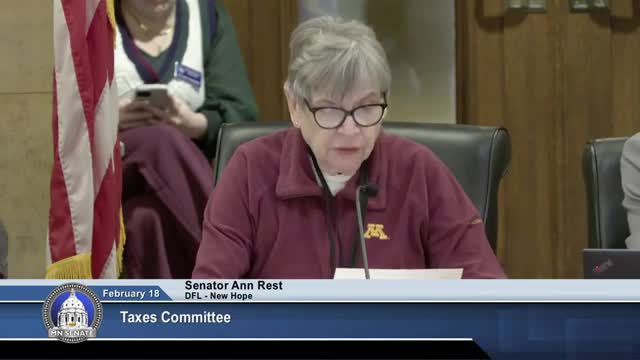Senate committee considers expanding sales-tax exemption to broadband providers, debates effect of the word 'primarily'
Get AI-powered insights, summaries, and transcripts
Subscribe
Summary
The Minnesota Senate Taxes Committee heard multiple bills to clarify or expand a sales-tax exemption for communications equipment so broadband providers pay no sales tax on fiber and conduit; lawmakers and industry witnesses said inconsistent Department of Revenue audits have caused disputes over the statute's word "primarily."
Senate Taxes Committee members on Feb. 18 heard two related bills that would clarify and expand a sales-tax exemption for communications equipment so that broadband providers qualify for the exemption.
Senator Putnam introduced Senate File 883 and offered an A1 amendment, which the committee adopted by voice vote. "As of January 2025, 390,000 Minnesota households lack access to broadband speeds of 100 to 20 MBPS," Senator Putnam said, adding that "62,000 households in the state of Minnesota do not have fundamental basic internet access." The bill would expand an existing sales-tax exemption for fiber and conduit purchased or leased by telecommunications or pay-TV services to include purchases or leases by broadband or internet service providers.
The bills are aimed at resolving what witnesses described as inconsistent Department of Revenue audits and disputes over statutory language that requires equipment be used "primarily" to provide telecommunications or pay-TV services. Brent Christensen, President and CEO of the Minnesota Telecom Alliance, told the committee the same equipment now commonly carries multiple services and that auditors have reached different conclusions about when the exemption applies: "One auditor told one of my members that as long as they use the fiber for telephone or television, they don't have to pay sales tax. Another auditor told another company that if it's 51% for telephone and television ... you don't have to pay sales tax. But it's 51% Internet, you have to pay sales tax."
Sarah Pisick, representing CTIA (the wireless industry association), urged removing the word "primarily" from the statute so that identical equipment used for voice, video and internet access is treated consistently: "It's nearly impossible to determine exactly what service a customer is primarily receiving from the exact same equipment," she said, arguing the change would provide certainty and avoid repeated audits and appeals.
Industry representatives also questioned the differing revenue estimates attached to the bills. Senator Rest noted the revenue estimate for one bill was roughly $6 million while the other was estimated at $2–3 million; witnesses said the variance stems from different assumptions about what share of telecommunications expenditures qualify under the exemption.
No final vote was taken on either bill; Senate File 883 was "laid over" as amended and the bill to remove "primarily" was also laid over for possible inclusion in an omnibus tax bill.
The committee signaled an intent to continue work with Department of Revenue staff to clarify the scope and fiscal effect of the statutory change before taking final action.
